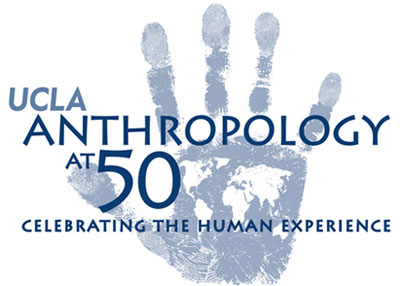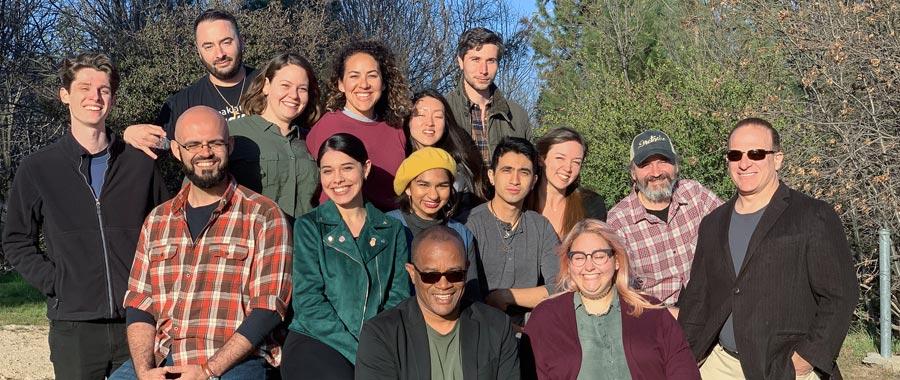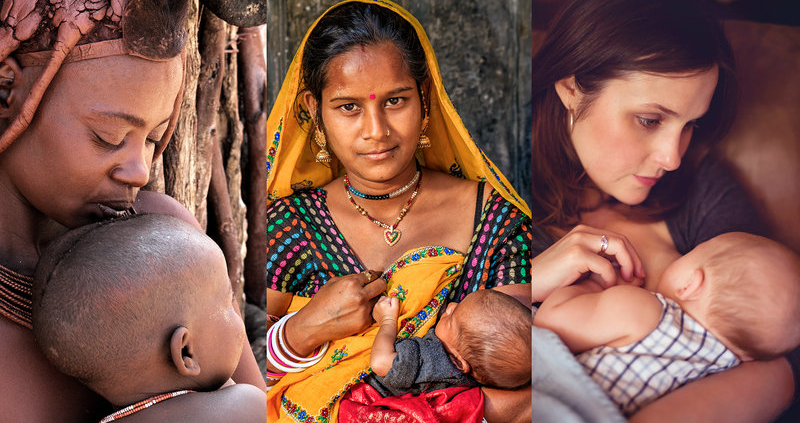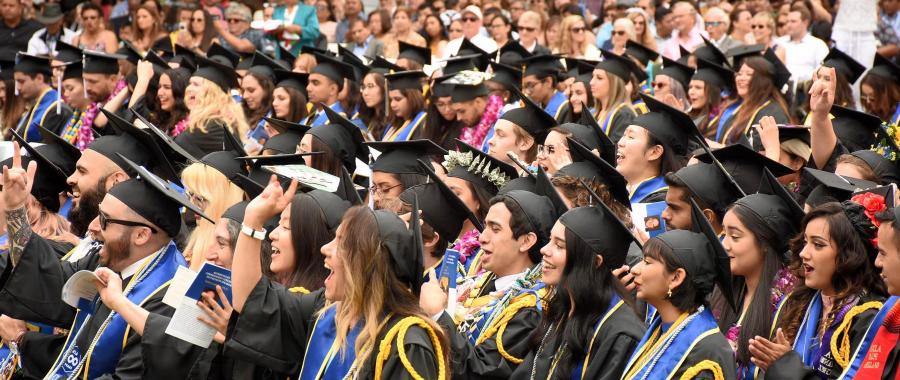Anthropology at UCLA
The UCLA Department of Anthropology has always taken a broad view of anthropology, maintaining both balance and integration among the four fields (archaeology, biological, sociocultural, and linguistic), which have traditionally characterized the discipline. Established in 1941, the department grew to prominence immediately after World War II and has consistently ranked among the top ten departments in the country, both for the distinction of its faculty and the quality of its teaching. Many faculty members actively engage in research and teaching in two or more fields, and many hold joint appointments in other departments and schools at UCLA. Indeed, Anthropology has ties with many other major departments in the university, offering a rich fare to graduate students.
Our faculty and students are dedicated to resolving fundamental questions that lie at the core of Anthropology as a field of intellectual inquiry. Their work encompasses such topics as the nature of evolutionary processes, human development, emotions and the mind, culture and communicative strategies, health and illness, the development of socio-political complexity across the historical and archeological record, and the impacts of differential access to power in the contemporary world. To that end, we conduct research in all parts of the world and engage in innovative collaborations that cross traditional sub-disciplinary and disciplinary boundaries.
Our doctoral program is one of the best in the country. The department was recently ranked 6th in the nation by the National Council on Research. Our faculty has earned international recognition including election to the National Academy of Sciences and the American Academy of Arts and Sciences. Their work is supported by grants and contracts from the National Institutes of Health, the Centers for Disease Control, the National Science Foundation, the National Endowment for the Humanities, the National Geographic Society, the Ford Foundation, the Rockefeller Foundation, the Alfred P. Sloan Foundation, the Spencer Foundation, the Wenner-Gren Foundation, and the W.T. Grant Foundation, among others. They have been honored with fellowships from all of the major foundations that support social science research including the MacArthur Foundation, the John Simon Guggenheim Foundation, the Center for the Advanced Study in the Behavioral Sciences, the Institute for Advanced Study, the Russell Sage Foundation, and the Max Planck Institute, as well as with a multitude of book prizes. Their teaching and mentoring have been rewarded with UCLA’s Distinguished Teaching Award, many other campus teaching awards, and a host of national prizes.
The great variety and richness of the departmental curriculum may best be appreciated by looking at the four traditional fields of Anthropology.
The Four Fields Approach to Anthropology
ARCHAEOLOGY
Anthropological archaeology’s great strength is its ability to investigate long-term cultural and historical processes using a comparative approach spanning space and time. Current research by UCLA archaeologists examines economic networks and production, urbanism, human-environment interactions, and the origins of social inequality and complex polities. Our faculty and students conduct research and collaborate with scholars from around the world, including in Mesoamerica, the American Southwest, South Asia, East Asia, Southeast Asia, Africa, and the Caribbean. Our research is distinguished by its multiscalar approach, and analyzes how human and environmental systems operate at scales ranging from individual actions to global networks.
UCLA archaeology is facilitating the redefinition of archaeological research. Archaeology is not just the study of the past, but also of the study of the present. We are in the forefront of what we describe as engaged archaeology, where descendant communities and other stakeholders are involved in our work. We collaborate closely with Indigenous and local communities where we work. Archaeologists at UCLA are also the leading way in using our work to address social justice issues and using our research findings to highlight the experiences of marginalized groups to help facilitate redress.
Our methods are equally diverse, spanning techniques drawn from the geological, biological and physical sciences to frameworks for interpreting material and visual culture deriving from a range of disciplines. What unites our subfield is a relentless focus on creating knowledge about humanity’s past and present efforts to address cultural and environmental change, social and political tension, economic challenges, population growth and migration, conflict, and ultimately the strategies that permit peaceful human cooperation. We work closely with colleagues in in other departments and schools at UCLA – ranging from psychology, urban geography, and sociology to mathematics, design, and education. Our faculty and students are affiliated with the Cotsen Institute of Archaeology at UCLA, which serves as a forum for interaction with archaeologists outside of anthropology and provides a dialogue among archaeological disciplines that is unique within the United States.
Archaeology faculty: Stephen Acabado, P. Jeffrey Brantingham, Jason De León, Justin Dunnavant, Caitlin O’Grady, Richard Lesure, Li Min, Greg Schachner, Monica L. Smith
BIOLOGICAL ANTHROPOLOGY
Biological Anthropology is the study of humans and other primates from a Darwinian point of view. Our program focuses on the evolutionary ecology of early hominids, extant primates, and contemporary humans, and includes training in evolutionary theory, behavioral ecology, evolutionary psychology, paleoanthropology, paleoecology, primate behavior, and biobehavioral studies of the physiological bases of primate social behavior. Faculty associated with the program have engaged in field work in Africa and Central America where ongoing projects include work on human behavioral ecology, human ethology, primate behavior, and hominid evolution. For more information on this program see the biological anthropology subfield website. Faculty in biological anthropology have close associations with the Department of Biology and the School of Medicine. Biological anthropologists are also active in the Center for the Study of Evolution and the Origin of Life (CSEOL) which sponsors interdisciplinary symposia and weekly seminars and offers graduate and senior fellowships.
Biological Anthropology faculty: H. Clark Barrett, Daniel Fessler, Molly Fox, Jessica Lynch-Alfaro, Susan Perry, Brooke Scelza, Brian Wood
LINGUISTIC ANTHROPOLOGY
Linguistic anthropologists in the 21st century are charged with confronting and analyzing intensified social inequality, including racism, racialization, gender, and sexuality in the contexts of late capitalism and settler colonialism, language and land, environmental change, extreme health and educational disparities, violence, globalization, and transnational/rural to urban migration in relation to how these formations and activities are mediated by particular languages and communicative skills. Linguistic anthropologists are currently engaged in a massive effort to understand how the global economy and rapid rise of new technologies are transforming the landscape of multilingual communicative repertoires and associated forms of cultural knowledge and semiotic practices. On the one hand, rapid shifts have ushered in new media literacies and linguistic registers as requisite to participating in global networks. On the other hand, massive migration, ubiquitous communication technologies including AI, and ever more porous boundaries of speech communities have created endemic changes in the modes and effects of communication in health, education, and workplace settings. Further, these changes have necessitated efforts to counter the endangerment of indigenous and minority languages and practices.
At UCLA, the linguistic anthropology subfield has strengths in (1) Verbal art and language activism, (2) Language and race/racialization (across Black, Indigenous, and Latinx communities), (3) Language and gender, (4) Language and politics, and (5) Language, technology, and multimodal research. We also have research interests in various other areas that include: language ideologies, multilingualism, language and migration, globalization, new media, popular culture, language and health, language and disability, language and violence, language and the environment, language and social institutions, and language across the lifespan. At UCLA, generally speaking, an emphasis is placed on both the micro-instantiation of sociality and sense-making through on-the-ground, embodied communicative practices and on encompassing political-economic forces that influence the viability of speech communities. Our research spans across various Indigenous communities in what is contentiously known as the “United States,” as well as communities in Africa, Europe, and elsewhere.
Linguistic Anthropology faculty: H. Samy Alim, Erin Debenport, Paul Kroskrity, Norma Mendoza-Denton, Zion Arina Mengesha
SOCIOCULTURAL ANTHROPOLOGY
Sociocultural Anthropology deals with two different but closely intertwined aspects of the human scene: the structuring of social relationships through economic, political, kinship, and gender systems on the one hand, and the perceptions, attitudes, and sentiments which characterize the outlook of peoples on the other. Faculty and graduate students in the department conduct research on a wide range of theoretical questions about the workings of social and cultural systems by field research and comparative/historical analysis. Fieldwork—abroad or in the US alike—is considered an essential experience for all graduate students. Current faculty research projects are taking place across Asia and the Pacific, Africa, Middle East, North America, South America, and Europe. As a distinctive emphasis within Sociocultural Anthropology, the Program in Psychocultural Studies and Medical Anthropology is offered jointly with the Department of Psychiatry (School of Medicine). Faculty and graduate students affiliated with the program participate in the “Mind, Medicine, and Culture” (MMAC) interest group. Another interest group bringing Sociocultural faculty and graduate students together is “Culture, Power, and Social Change” (CPSC). As a forum to engage contemporary ethnographic research, CPSC explores issues of cultural production, links between political economy, power and culture, cultural constructions of ethnicity, gender, national and transnational identities, and the ways in which they impact social change in the world.
Sociocultural Anthropology faculty: Salih Can Aciksoz, H. Samy Alim, Hannah Appel, Andrew Apter, Aomar Boum, Jessica Cattelino, Alan Fiske, Linda Garro, Akhil Gupta, Douglas Hollan, Laurie Kain Hart, Christopher Kelty, Nancy Levine, Jemima Pierre, Kyeyoung Park, David Shorter, Susan Slyomovics, Shannon Speed, C. Jason Throop, Yunxiang Yan
Contact Us

375 Portola Plaza
341 Haines Hall
Box 951553
Los Angeles, CA 90095310 825 2055





